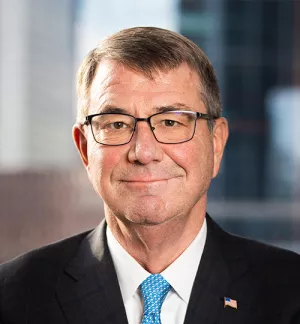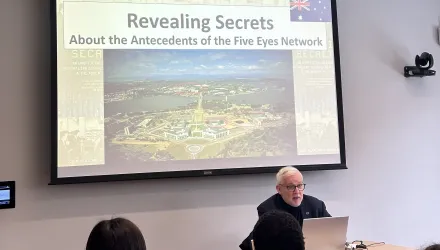
Introduction
Good morning. First, let me thank Ambassador Nick Burns, Dr. Carter, and the Harvard Kennedy School for hosting me here today.
As T.S. Elliot lamented, April is the “cruelest month”. And, Elliot’s words have remarkable resonance today as we face crises abroad and chaos, both intended and unintended, at home. But, the President’s policies and temperament may make this April seem tranquil as we confront even more challenges in the coming months, ranging from the proposed rejection of the Iranian nuclear deal to the high stakes negotiations with the North Koreans over their rapidly maturing nuclear program.
And, at this time, we are a government in disarray facing a world in disarray, and there is very little, if any, margin for error. The governmental disarray is obvious, especially in the area of national security. It springs from the President’s impulsive, often uninformed, and disruptive personality. The President is not unique in imposing his personality on his Administration. Indeed, that seems to be the nature and expectation of every Presidency. What is unique is the temperament of this President and how it has translated into a deliberate diminishment of the State Department and our diplomatic capacity at a time when we have the greatest need for robust diplomacy.
We are without Ambassadors in 50 countries including South Korea, Saudi Arabia, Egypt, Jordan, and Somalia. All of these nations are of great strategic importance or are being supported by United States military forces or, indeed, both. The Administration has proposed draconian cuts to the State Department’s budget and, even if funds are available, they have refused to spend them. Career personnel are leaving in droves, thereby sapping the Department and the country of the expertise crucial to conduct successful foreign relations.
To date, the President is on his third National Security Advisor. And, John Bolton is more likely to function as an ideologue and political operative than a wise counselor. His preference for bellicose threats appears more attuned to the President’s whims than a response to a realistic appraisal of the threats and opportunities that face the country. And, we are “in-between” Secretaries of State, as Rex Tillerson was routinely undercut by the President, enduring a death by a thousand tweets, and Mike Pompeo is facing a difficult confirmation process as he tries to avoid offending the acute sensitivities of the President while somehow attempting to articulate a foreign policy that is defined by something more than the moods of the President.
And, there is no escaping the reality that the Special Counsel’s investigation permeates every aspect of the White House. This adds to the lack of sustained focus, both personally and institutionally, of the President and his Administration. This factor will persist until Special Counsel Mueller is allowed to complete his investigation, which could create even more complications for the White House.
This April saw these factors coalesce around the President’s response to the murderous and abhorrent use of chemical weapons by the Assad regime against their own people. The President and the world community were justified in their outrage, and joint operations with Great Britain and France made a powerful statement about the consequences of the use of chemical weapons not only in Syria, but by any state or non-state actor. But, this episode was characterized more by compulsive tweets and off-the-cuff comments than by deliberate policymaking.
The President surprised his national security advisers when he casually announced in a speech on March 28th that we would be withdrawing our special operations forces from Syria “very soon.” Some have speculated that this could have, in some way, emboldened the Assad Regime to accelerate their pressure on rebel forces and the population by initiating the chemical attack on April 7th. In any case, as options were being developed to respond to the chemical attack, the President, untethered to his national security staff, tweeted that we would conduct a missile attack on Syria. He had casually set up a “red line” that generated its own political and policy momentum for a kinetic response, which may have muted other options and a longer policy view.
Indeed, lost in these visceral reactions was adequate consideration for the legality of such a response and the development of a long-term strategy for Syria and the region. “Tit-for-tat” may work to inhibit the use of chemical weapons by Syria, but it does nothing to resolve the multiple complicated policy issues on the ground. Will we continue to insist on the departure of Assad? What is our continuing relationship with the Kurdish forces who played such a prominent role in our battles with ISIS? How do we reconcile Kurdish aspirations in Syria with Turkish concerns? How do we ensure that ISIS cannot reconstitute itself? How do we deal with the Iranian presence not only in Syria but in Iraq, Lebanon, and Yemen? How do we deal with a Russian presence that enables Assad and profits from his survival? I am not optimistic that these questions will be adequately addressed because of the 6 President’s “Mission Accomplished” attitude, his difficulty in sustained attention, and the lack of stable and experienced foreign policy leaders as well as institutional capacity.
So much for April.
In May, and the days that follow, the President has both inherited and created a combination of events that could undermine stability throughout the world. By May 12th, he must decide whether to continue to waive nuclear-related sanctions on Iran as required by the Joint Comprehensive Plan of Action, or JCPOA. On May 14th, he is expected to order the symbolic opening of the United States Embassy in Jerusalem at a time when popular unrest among the Palestinians has already generated organized demonstrations resulting in multiple deaths. President Trump’s “offhand” comments about withdrawing our forces from Syria could accelerate the declared intentions of Israel to conduct more sustained attacks against Iranian forces and proxies in Syria and Lebanon. The level of violence and Iranian reaction is unlikely to be 7 restricted to Syria and a confrontation including Iraq, Saudi Arabia, and others in the region is a real risk. At the same time, the Administration will be attempting to focus its efforts on negotiating the agreement to denuclearize North Korea. And underlying all of this is the intensifying great power rivalry with Russia and China.
Iran/JCPOA
As I mentioned, the President faces a critical decision in mid-May whether to unilaterally withdraw the United States from the JCPOA. The JCPOA, completed in 2015, among the United States, the United Kingdom, France, Germany, Russia, China, and Iran, sought to limit Iran's nuclear weapons program in exchange for a broad lifting of United States, European Union, and United Nations sanctions on Iran.
I support preserving the JCPOA. The United States and the world are safer with it. By all accounts, the JCPOA is working as intended and Iran is verifiably meeting its commitments under the deal. Our non nuclear sanctions on Iran remain in place and are unaffected by the JCPOA. Also, Congress authorized additional sanctions last July to help deal with destabilizing Iranian behavior in the region. If not for this agreement, Iran would likely be a nuclear power today, and irresponsibly withdrawing from it could accelerate Iran’s path to nuclear weapons and make America less safe.
In January, President Trump signaled his intent to take actions that would result in the U.S. withdrawing from the JCPOA unless it is “fixed” – his words, not mine – by adding additional restrictions not included in the original agreement. This ultimatum generates a crisis of his own making at a time when our limited diplomatic resources should be focused on North Korea.
Withdrawing from the deal could be a devastating blow to our efforts at diplomacy with North Korea – and, for that matter, any future diplomatic efforts to constrain aggressive or destabilizing behavior by our adversaries. Why would any nation engage with us in serious dialogue to resolve differences if they fear we will later withdraw unilaterally and without cause? Furthermore, abandoning the JCPOA would isolate the United States diplomatically from the international community at the very time we need worldwide cooperation to address the threat posed by North Korea.
These are not only my views, they are also those of our nation’s most senior military leadership. As Secretary Mattis told the Armed Services Committee at his confirmation hearing regarding the JCPOA, “when America gives her word, we have to live up to it and work with our allies.” General Dunford, Chairman of the Joint Chiefs of Staff, expressed his belief that “the U.S. would incur damage vis-a-vis our allies if we unilaterally withdraw from the JCPOA. Our allies will be less likely to cooperate with us on future military action to prevent Iran from acquiring a nuclear weapon and less likely to cooperate with us on countering other destabilizing aspects of Iranian behavior that threaten our collective interests.” In sum, when we don’t live up to our word, we dramatically weaken our diplomatic tools, thereby making military action far more likely.
Let there be no doubt, Iran continues to be a state sponsor of terror and an abuser of human rights. Iran continues to destabilize the region through its development of ballistic missiles and support for proxies in Iraq, Syria, Lebanon, Yemen, and elsewhere. If Iran behaves this way without a nuclear weapon, imagine how much worse a nuclear-armed Iran would be.
We should build upon, not throw out, the JCPOA and work aggressively with our international partners to ensure that necessary restrictions afforded by the JCPOA are appropriately extended or supplemented.
North Korea
With respect to North Korea, the announcement that President Trump will be meeting with Kim Jong-un has created an opportunity for a breakthrough in this crisis. Given where we were a few months ago when the administration was threatening limited strikes on North Korea, I am relieved to say we have come a long way, but we still have a long, hard road ahead of us.
We all hope that the inter-Korean summit and President Trump’s summit with the North Korean leader present us with an opportunity to craft a comprehensive negotiated settlement. However, we must recognize that the negotiations may fail. If that happens, we could find ourselves in a more challenging position than before the negotiations with a renewal of dangerous rhetoric about war with North Korea, but now more supercharged by those advocating for military action claiming that diplomacy has failed.
The objective of the upcoming negotiations must be twofold: first, to reduce the threat posed by North Korea to the United States and its allies by permanently dismantling its nuclear and ballistic missile programs, addressing the regime’s chemical and biological weapons, as well as preventing future cyber-attacks. Second, the negotiated settlement must not undermine our alliances or our ability to project power in the region.
President Trump cannot negotiate a vague and superficial agreement and then claim success. The devil is in the details for an agreement of this nature since we have had several agreements in the past which have all fallen apart. Complicating matters further is the strong possibility that President Trump withdraws from the JCPOA while trying to garner support for a North Korea agreement. It is questionable in my mind if countries like China and Russia are going to be eager to put their support behind an agreement with North Korea if we are at the same time unilaterally withdrawing from a deal in which they have national security interests.
The Trump administration must manage expectations for the summit, especially with the new progressive government in South Korea which is anxious for a deal. Given North Korea’s all-consuming drive for strategic nuclear capabilities, and its history of failing to adhere to negotiated agreements, we should all recognize that the likelihood of either near-term or long-term success for the talks is low. Even in the event that North Korea agrees to verifiable denuclearization on terms that we can accept, the process to get to a denuclearized North Korea will take years, if not decades. The temptation for the regime to cheat on the agreement by failing to declare secret nuclear sites or proliferating weapons of mass destruction to others will be high. During that time we will still need to pursue a long-term deterrence, containment, and non-proliferation strategy. The complexity of the issues involved in negotiating a comprehensive deal with North Korea has caused prior negotiations and agreements to collapse. I worry that this Administration does not fully appreciate the uphill battle it faces in the coming months.
And it is critical that, if negotiations are not successful, the administration does not pivot to preparing for a preemptive war with North Korea. If we prosecute a war with North Korea we will see significant casualties, both military and civilians. Such a conflict will likely damage our ability to compete with China in the long-term because we will have neither the capacity nor the resources to devote to that endeavor. We will weaken our position in Asia by harming the global economy, significantly weakening our alliances, and providing China and Russia with opportunities to act as spoilers during what could prove to be a decades-long war. I believe there is growing agreement that war is not an acceptable alternative, and that we should instead focus on sustaining pressure on North Korea through sanctions and deterrence.
Russia
Affecting all of these issues, indeed monopolizing the attention of a vast majority of Americans is the ongoing investigation by Special Counsel Mueller regarding Russian interference in our elections, and the growing recognition of persistent, current activities by Russia to subvert our electoral process and undermine democratic norms. The Mueller investigation is amplified in the public mind by a score of collateral investigations involving Stormy Daniels and Playboy bunnies and a cast of characters usually reserved for a B movie.
Russia attacked the heart of our democracy when it sought to influence the 2016 Presidential election. This hybrid operation, employing multiple tools of national power, sought to weaken our democratic institutions, amplify and exacerbate social tensions and, generally, sow chaos. The evidence that this attack occurred is irrefutable and has been validated across our intelligence community. Special Counsel Mueller’s indictment of 13 Russian individuals and 3 organizations involved in these Russian operations further confirmed the existence and extent of Russian interference in our elections.
Our Intelligence Community has assessed that the Kremlin will conduct bolder, more disruptive, cyber operations in the coming year, including with attempts to try and affect our midterm elections.
Despite warnings, we’ve repeatedly heard from Administration officials that the White House has not directed the intelligence agencies or the relevant DOD components to disrupt or blunt Russian cyber and other attacks against the fundamental institutions of our democracy.
We cannot sit back and wait for the next attack. We should be hardening our defenses and finding ways to counter Russian aggression. This must be a whole-of-government approach that utilizes both the military and non-military tools in our arsenal including cyber; diplomacy; economic sanctions; financial taskforces to counter foreign corruption and money laundering; and strategic communications.
Deficit Cliff
I want to make a final point. My comments have touched upon the lofty precincts of strategy and geopolitics. However, after several years in the Congress, I recognize more and more a homely fact: show me your budget and I will tell you your strategy.
After years of underfunding defense and nondefense priorities Republicans and Democrats came together to set aside the harmful and destructive sequester-level budget caps that were installed during a period of brinkmanship in 2011 but, by next Spring, the Congress will be back in the struggle to raise sequestration caps once again. This debate will be colored by concern about the debt, which Republicans made worse by the $1.5 trillion deficit- financed tax cuts passed last year. In CBO’s recent projection, “debt held by the public rises from 78 percent of GDP (or $16 trillion) at the end of 2018 to 96 percent of GDP (or $29 trillion) by 2028. That percentage would be the largest since 1946 and well more than twice the average over the past five decades.”1
These projections, which are based on current law, likely underestimate the deficit trajectory. Our nation faces a host of unavoidable defense and non-defense costs that are not factored into current law. These range from decades-long needs to modernize our nuclear triad, the generally acknowledged but financially ignored need to harden our society from cyber threats, the crisis in pensions throughout the country, funds that will be needed for emergency disaster relief, and the demographic pressures on programs like Medicare and Medicaid. This list goes on.
The growing deficit and impending sequestration will have severe consequences. They will constitute a major distraction from thoughtful debate and responsible action on issues of national security. They will likely lead to stopgap measures like recurring continuing resolutions that disrupt planning at DOD and every other Federal agency, and, ironically add cost and inhibit readiness and modernization. If our nation’s fiscal strategy does not take into consideration the need for revenue, deficit driven measures like these likely will make it exceedingly difficult to follow through with a long-term strategy with regard to any serious national security or domestic challenges.
Conclusion
As you can see, we are living in incredibly complex times and, to date, the Administration has not demonstrated leadership commensurate with these challenges.
It is my hope that individuals in the Administration and leaders among our allies and partners will continue to communicate and cooperate to ensure that we successfully navigate the many difficult decision points that lie ahead. It is also incumbent upon those of us in Congress to redouble our efforts to achieve the compromise necessary to help the nation through this trying period.
Thank you again for allowing me to be with you today and I will now be happy to answer your questions.
Footnotes
1 “The Budget and Economic Outlook: 2018 to 2028”, Congressional Budget Office, April 2018, p. 5.






